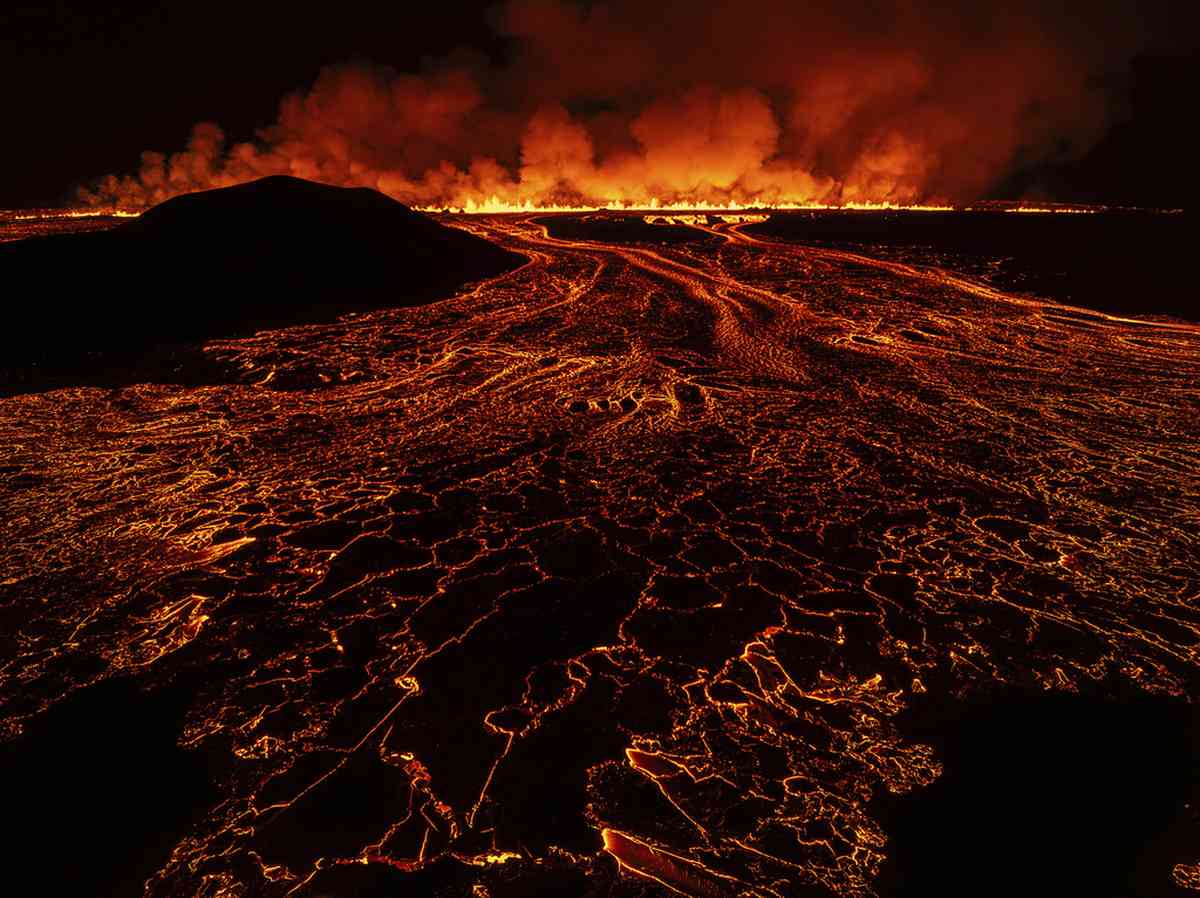
A new volcanic eruption that started on the Reykjanes Peninsula in Iceland, Wednesday, Nov.20, 2024.
11:59 JST, November 22, 2024
GRINDAVIK, Iceland (AP) — A volcano in southwestern Iceland that has roared back to life after eight centuries of silence has erupted for the seventh time since December, sending molten lava flowing towards the Blue Lagoon spa, a major tourist attraction.
The eruption on the Reykjanes Peninsula started with little warning at 11:14 p.m. (2314 GMT) Wednesday and created a fissure around 3 kilometers (1.8 miles) long. The activity is estimated to be considerably smaller than the previous eruption in August, according to Iceland’s meteorological office that monitors seismic activity.
Most of the previous eruptions have subsided within days.
“In the big picture, this is a bit smaller than the last eruption, and the eruption that occurred in May,” Magnús Tumi Guðmundsson, a professor of geophysics who flew over the scene with the Civil Protection agency to monitor the event, told national broadcaster RUV.
While the eruption poses no threat to air travel, authorities warned of gas emissions across parts of the peninsula, including the nearby town of Grindavík, which was largely evacuated a year ago when the volcano came to life after lying dormant for 800 years.
Around 50 houses were evacuated after the Civil Protection agency issued the alert, along with guests at the Blue Lagoon By Thursday afternoon lava had spread across parking lot of the geothermal spa, one of Iceland’s biggest tourist attractions, consuming a service building.
Lava also reached the pipeline that supplies the peninsula with hot water for heating, the meteorological office said, though the pipes were built to withstand lava flow.
The repeated volcanic eruptions close to Grindavík, which is about 50 kilometers (30 miles) southwest of the capital, Reykjavik, and had a population before the eruptions of 3,800, have damaged infrastructure and property, forcing many residents to relocate to guarantee their safety.
“Grindavík is not in danger as it looks and it is unlikely that this crack will get any longer, although nothing can be ruled out,” Magnús Tumi said.
Iceland, which sits above a volcanic hot spot in the North Atlantic, averages one eruption every four to five years. The most disruptive in recent times was the 2010 eruption of the Eyjafjallajokull volcano, which spewed clouds of ash into the atmosphere and disrupted trans-Atlantic air travel for months.
Top Articles in News Services
-

Survey Shows False Election Info Perceived as True
-

Hong Kong Ex-Publisher Jimmy Lai’s Sentence Raises International Outcry as China Defends It
-

Japan’s Nikkei Stock Average Touches 58,000 as Yen, Jgbs Rally on Election Fallout (UPDATE 1)
-

Japan’s Nikkei Stock Average Falls as US-Iran Tensions Unsettle Investors (UPDATE 1)
-

Japan’s Nikkei Stock Average Rises on Tech Rally and Takaichi’s Spending Hopes (UPDATE 1)
JN ACCESS RANKING
-

Producer Behind Pop Group XG Arrested for Cocaine Possession
-

Japan PM Takaichi’s Cabinet Resigns en Masse
-

Man Infected with Measles Reportedly Dined at Restaurant in Tokyo Station
-

Israeli Ambassador to Japan Speaks about Japan’s Role in the Reconstruction of Gaza
-

Videos Plagiarized, Reposted with False Subtitles Claiming ‘Ryukyu Belongs to China’; Anti-China False Information Also Posted in Japan



























